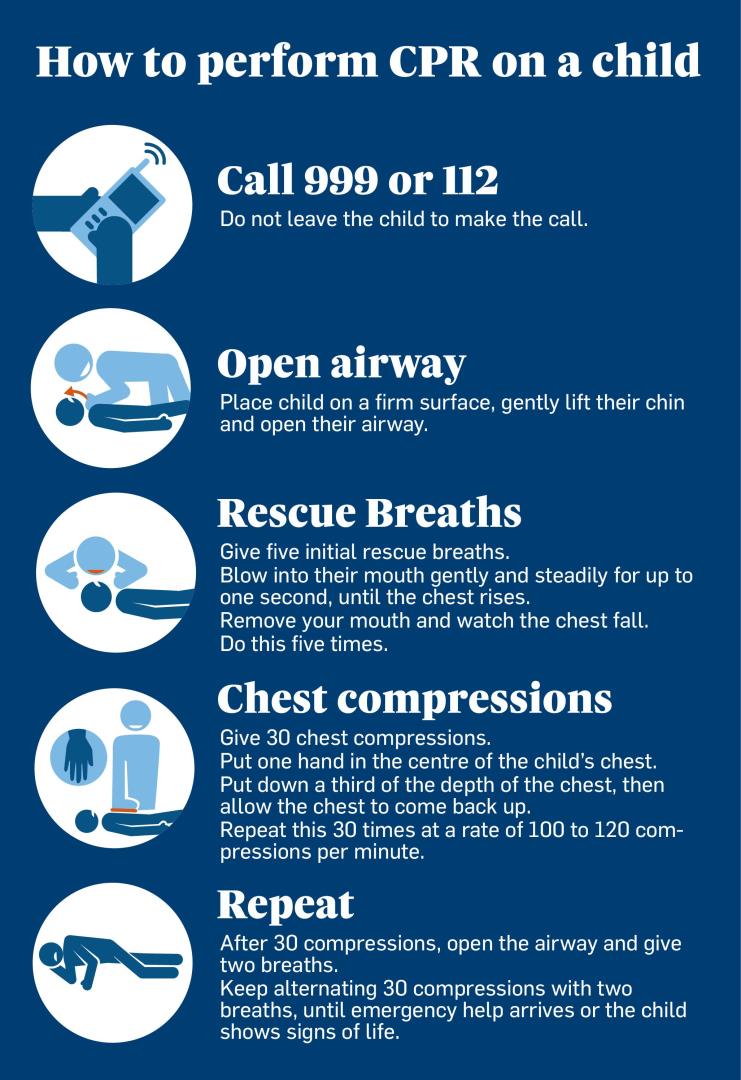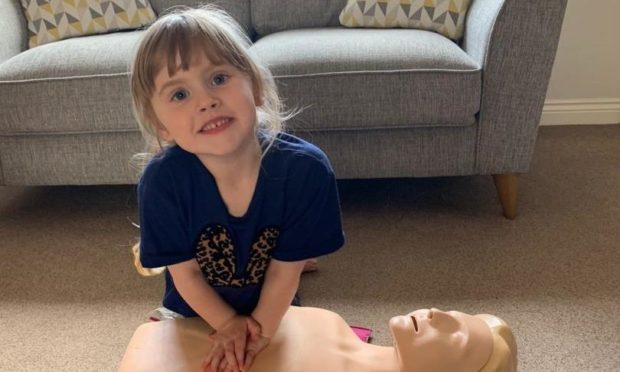Parents are being urged to acquire basic first aid skills, after a survey showed a large percentage of them don’t know how to respond in an emergency situation involving their children.
And experts say we also need to educate our children in first aid, as there will be situations where they are the only one around to help.
The importance of those first crucial moments was highlighted during the distressing scenes at the Euros on Saturday, when Denmark star Christian Eriksen, 29, collapsed during a game.
He eventually regained consciousness after undergoing CPR and being treated with a defibrillator.
That incident has brought home to many their lack of basic first aid skills, and not least parents.
Falls are one of the most common causes of childhood accidents.
In Scotland last year, more than 4,200 children were admitted to hospital after a fall.
Head injury fears
However, a recent survey by St Andrew’s First Aid showed that over half of parents whose children had suffered a head injury didn’t know what to do.
Choking is another common hazard for young children, however one in three parents said they wouldn’t know what to do if their own child was choking.
Basic first aid can be life-saving in situations like this.
However, recent research shows around three-quarters of people lack the knowledge and confidence to administer basic first aid.
It may take only seconds to dial 999, but the average target response time for an ambulance is eight minutes, against only four seconds in which choking can prove fatal.

Aberdeenshire man Brett Townsley stressed the importance of both parents and children learning first aid as early as possible.
He would know, as his daughter is one of the youngest first aid instructors in the UK.
Four-year-old Emerie-May knows how to give CPR and demonstrates the Heimlich manoeuvre on her teddy bear.
Dad Brett, of Belhelvie, runs a health and safety company, Omniscient Safety Innovations, and regularly involves Emerie-May in online classes.
‘Those first moments are crucial’
“My daughter was two when we first started teaching her, and since then she’s really developed her skills,” said Mr Townsley.
“She’s able to perform CPR and the Heimlich manoeuvre on the dummies, and knows what to do in an emergency situation.
“She’s now even teaching it to others during our online classes, she absolutely loves it.
“It shows you’re never too young to learn.
“And in fact, the earlier the better.
“The idea is that by learning these skills early, when an emergency situation arises, muscle memory kicks in and you’re able to act automatically.
“If you don’t have that knowledge ingrained, you can’t react – it’s then that people panic and freeze.
“But as the Eriksen incident showed, it’s those critical early moments that can save lives.
“His teammates knew what to do, you saw how his captain got his tongue out the way and put him in the recovery position.
“Those first moments before professional help arrives are crucial.
“If you have that skillset and the ability to react without thinking, lives can be saved.”
He added: “Although Emerie-May is well-versed in what to do, we have a refresher chart in the kitchen reminding her of the steps, and who to call.
“There’s perhaps a misunderstanding of the importance of child first aid.
“But let’s say you’re a single parent – if you suddenly collapse in the house, you might only have your child around to help.
“If a kid in that situation knows how to react, they can save their parent’s life.
“That knowledge of how to react, at any moment, is invaluable and I think we should be teaching it to children a lot more.”
‘Everyone should know first aid’
St Andrew’s First Aid training manager Angela McCappin said: “We firmly believe that everyone should know first aid, it’s a life skill that everyone should have.
“Whether it’s knowing what to do if someone is choking or how to help if they’ve suffered a cardiac arrest – first aid saves lives.
“Anybody can injure themselves or become ill and anybody should be able to assist.
“The younger you can teach people, the better, because it is such an important skill to have.
“Skills range from providing some TLC and just reassuring someone, right through to performing CPR which is a life-saving skill.
“First aid is not a difficult subject to learn and we believe that doing something is better than doing nothing.”
In the past five years St Andrew’s First Aid has trained more than 110,000 people in a wide range of first aid skills.
It works in schools, through its BandAge programme, in communities and with young carers to teach these life-saving skills.
Ready for Life course pilot
This week it is piloting a new Ready for Life course which will be rolled out initially in five local authority areas, providing pupils from the age of 14 with two certifications, one in Emergency First Aid at Work and another in First Aid for Mental Health Awareness.
The course is available to pupils in Dundee, Glasgow, South Lanarkshire, North Lanarkshire, and East Renfrewshire – and it’s hoped it’ll then be rolled out across the country if it proves a success.
And Mini First Aid run classes in child first aid for parents across Aberdeen city and shire, Moray, and the Highlands – for information visit www.minifirstaid.co.uk/classes/classes-for-adults
